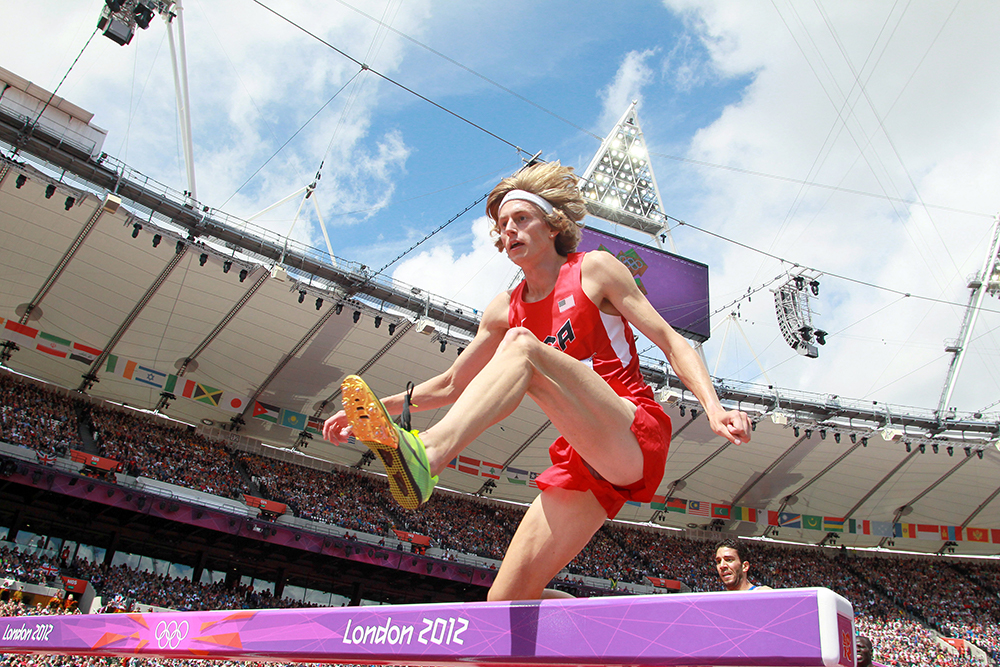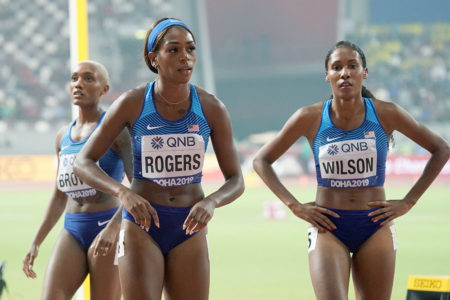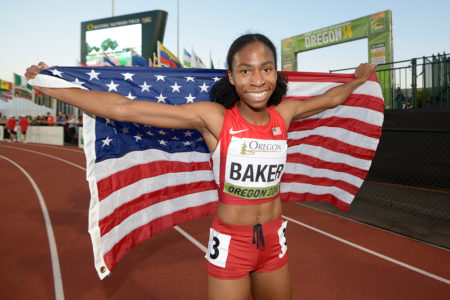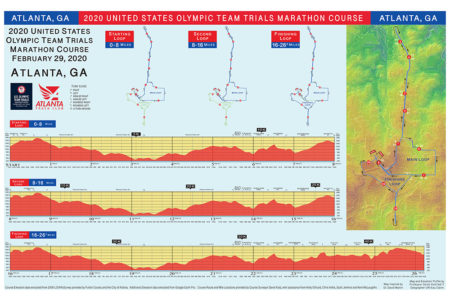
SEEN & HEARD as we launch another Olympic year:
EVAN JAGER is hoping to come back from injury and return to the steeplechase wars in a big way. In January the American Record holder posted on Instagram, “I hurdled for the first time since August 2018 and damn did it feel good! After sustaining a foot injury at the end of the 2018 season recovery has been an incredibly up and down road. 2019 was a really hard year for me mentally, physically and emotionally and I have had a certain amount of doubt as to whether or not I was ever going to be able to Steeple again. I always believed that I would but that doubt was always creeping in the back of my mind.
“Today was exactly what I needed to prove to myself that I would get back to being the athlete I knew I could be. Being able to hurdle might not be the biggest accomplishment but this year I’m trying to celebrate the little victories and not be so hard on myself when things don’t go exactly to plan. Anyways I’m happy and F@#&ING amped for this year!”
Allyson Felix, now 34, told NBC that after a maternity-shortened ’19 season that saw her run no 200s we’ll see her back in her longtime flagship event this time around, in addition to the 400. “Everything’s on the table this year,” she said. “This year, I’m going to be getting back to sprinting. I think that’s really key for me to be myself, and that’s something that I didn’t even get to touch last year.”
After missing Doha with a knee problem Kenyan 1500 star Elijah Manangoi says he will be ready for Tokyo. “It was a bad injury; I would term it a monster injury because it took away what I desired most in my career,” he says. “I want to forget it and a good season in 2020 will help a great deal. Now I am back, ready to contest for the Olympic Games title.”
Apparently tired of waiting for his U.S. citizenship to come through, 17-time NCAA champion Edward Cheserek is reportedly going to try to make the Kenyan team for the Olympics. “Edward has decided to go ahead and compete for Kenya if he can qualify,” explains coach/agent Stephen Haas. “There is still an uncertain timeline for U.S. citizenships and he feels he can make teams and compete at the highest level.”
Once again, Auburn sprinter/footballer Anthony Schwartz will skip spring football to concentrate on track. But he says, “There will probably be a decision coming. If I make an Olympic team, I feel like I’ll just stick with track. If I run and kind of have the season I did last year, I think I’ll stick with football.” As a Florida prep, Schwartz was the No. 1 All-America in both dashes as a senior after having been No. 1 in the 100 as a junior. His PRs— 10.09(A)/10.13 & 20.47—date to his ’18 season.
A Rio 4×4 gold medalist, Gil Roberts isn’t done in a year that will see him turn 31. He says he’s heading to the Trials at full speed. “I’m in the peak of my career,” he feels. “I’m in way better shape today than I’ve ever been in my life as far as speed and fitness-wise, stamina-wise. I’m going to let God tell me when I’m done running. I’m going to go until I can’t go no more.” As for the trademark gold chains he likes to wear while racing, he says, “I do this because it’s me, and I’m at my most comfortable and my best when I’m being myself.”
NCAA cross country 3rd-placer Katie Izzo is experiencing a resurgence at Arkansas after she experienced what might easily have been a career-ending injury in her first college go-round at Cal Poly SLO. “My tibia and fibula bones snapped in the middle of the race, and a week later I had surgery,” she says. She now carries a 12-inch titanium rod in her leg and teammates call her the “bionic woman.” She sat out five straight seasons (in/out/XC) recovering. Now she says, “It was all a blessing in disguise. If that hadn’t have happened, I never would have come to Arkansas.”
Faith Kipyegon, silver medalist in the blazing WC 1500, says she will be much stronger in Tokyo. “For sure I expect this year to be different from 2019 because I had a very short time to prepare for World Championships having come back from maternity break,” she says. “I know that if I build up well towards Tokyo then I will be much stronger.”
Getting ready for a defense of her Olympic shot title would be a lot easier if Michelle Carter had transportation. Turns out her car has been trapped in the garage ever since an Amazon driver crashed into the door in early December while making a delivery to her neighbor. “I just really want this to be over with,” Carter told WFAA after 6 weeks of the door not being operational. “I have to ask friends for a ride and try to borrow people’s cars, try to Uber places.” Amazon says it is trying to resolve the situation as soon as possible.
Eliud Kipchoge says he is ready for one of the most ballyhooed marathon clashes ever, when he and Kenenisa Bekele, the history’s two fastest, clash in London on April 26. “I don’t want only to win, but to achieve. You can define ‘achieve’ on your own,” he says. “Records will always be broken if you get the right people and the right people to mentor the athletes and tell them that they should challenge themselves and build their careers, and know that it’s not just about winning, but running a fast time, breaking a world record, breaking a course record. If all athletes understand that and feel hungry for that, then World Records will be broken.”
Galen Rupp, forced to find a new coaching setup following the 4-year ban of longtime mentor Alberto Salazar, reached out to Northern Arizona head coach Mike Smith. “I had never met or spoken to Galen Rupp in my life,” said Smith in an e-mail made public by Runner’s World. “The phone call I received from him was a surprise. This was not a road I wanted to go down. To be honest, it was just easiest to turn it down.”
Instead, the architect of Northern Arizona’s great distance success said yes, and is priming Rupp for the OT Marathon. “What I found out by getting to know Galen was that there was much more going on than the picture portrayed of him, and I wish the world knew that. I have never seen someone more all-in in my life.”
Heptathlete Alex Gochenour has opened up about the positive test for the anabolic agent Ostarine (“Status Quo,” December) that earned her a 4-year ban. In a long post on Twitter, she said it was a low-level test (0.01 ng/ml). “I believe that’s equal to about a grain of salt in a swimming pool,” she wrote. “I have spent countless hours and thousands of dollars trying to find a source, thus proving my innocence.” She failed, and chose to sit for an interview with USADA. Afterwards, she was told that WADA was considering changing the threshold for ostarine, “meaning I was within the legal limits and my case would disappear.” That never happened. “I am angry. I was guilty until proven innocent,” she continued. “A burden that is SOLELY mine. I’ve been treated like it was a criminal investigation with none of the actual standards of a criminal investigation.”
Molly Huddle recently wrote a guest editorial in the Providence Journal advocating for the Senate passage of the Rodchenkov Anti-Doping Act. The bill, already passed in the House, would criminalize sports-doping conspiracies. “When the playing field is not level because of realities like Russian state-sponsored doping, it hurts both athletes and the communities we come from,” she wrote. “Clean athletes are role models for Rhode Island youth, but our accomplishments are overlooked when the podium is unattainable due to widespread doping. When a medal is stolen from a clean athlete, the scope of that athlete’s influence as a positive mentor is diminished. When we don’t win, we don’t receive the media coverage, at home or nationally, to inspire the next generation to pursue their own dreams.”
And just who can run faster than 9.58? Usain Bolt says there’s a chance his 100 record will fall in Tokyo. “Anything is possible,” he said late last year. “I’m looking to see what happens next season. Let’s see whose running fast, let’s see who is doing good.” He says the track surface will play a role: “I talked to some of the guys that were wearing spikes and they said it felt solid, it felt quick. And it’s brand-new and when it’s new it’s always good.”
Miler Nikki Hiltz says that her coming out last year was probably a major factor in her breakthrough season on the track. “When I decided to be who I am, a weight was lifted. I don’t think my breakthrough season was coincidental—I was holding back this part of me, hiding it and burying it. When you’re happy and holistic off the track, it’s going to translate on the track. That was that.”
“I’ve been fortunate to make it already,” says Jenny Simpson of her Tokyo Olympic quest for what would be her fourth squad. “I feel grateful already going into the season. I do think it’s a misconception, though, that one year builds on another—every year stands on its own for me and I feel like I have to re-earn that right to stand on the starting line really believing I can make the team again.”
Arkansas women’s head Lance Harter is not even close to making retirement plans at age 69. “I love what I do,” he says. “I look forward to going to work every day. Is there going to be a time when I probably need to be honest and address that? Yes. Is there a capacity where I maybe turn over the head job to somebody and then I become either just the distance coach or possibly a volunteer coach? I love coaching, and I think it keeps you young.”
Ethiopian marathoner Derara Hurisa said he forgot to bring his racing shoes to the Mumbai Marathon. The adidas-sponsored runner then had no choice but to turn to friend Abraham Girma and borrow a pair of his Vaporflys. “I lost my regular shoes in flight and am waiting for them,” said the not-quite-victimized Hurisa, who won the race in 2:08:09, scoring a $60,000 payday.
In an apparent response to the explosion of fast times in the 26-miler, Yuta Shitara says he will only accept the final spot on the Japanese Olympic marathon team if he can run 2:04 or better at the Tokyo Marathon in March: “Even if I break the national record and am chosen, unless I run 2:04 I won’t deserve to run in the Tokyo Olympics.” The Japanese Record Is 2:05:50.
The U.S.’s newest 19-foot vaulter after his early 19-1 (5.82), Kyle Pater has come a long way, says Air Force vault coach Scott Steffan. “If you would have seen Kyle his freshman year here, we thought he was probably going to hurt himself pretty bad if not die a couple times when he planted the pole. He was a little crazy.”
South Africa missed a men’s 4×1 medal by just 0.30 in Doha. Coach Paul Gorries thinks he can get his foursome on the podium in Tokyo. “We came back home and analyzed it and there’s still a lot more we can do with the changeovers, and there’s a lot of work to be done on where we exchange the baton in the zone,” he points out. “So if I can get what I want from the guys at the training camps, with the assistance of people who are working with me, I’m sure we can run way under 37.60 and that will definitely put us in the medals.”
No. 1-rated long jumper Malaika Mihambo PRed at 23-11½ (7.30) to win the WC title, but is hoping for farther in the future: “Well, I know very well I am 18cm behind Heike Drechsler and her German Record [24-6½/7.48]. I am confident that I can add something to my best performance so far. But I’m also a realist enough to know that something like that can’t be forced. In addition to my health and my level of training, the right competition conditions must also be in place. In this respect, I am not actively pushing for a distance like this because there are so many factors that I cannot influence myself.”
After placing 4th at Rio, Irish 400 hurdler Thomas Barr hopes he can again be in the mix. In Doha, he just missed the final. “It was a frustrating Championships because I was in better shape than I represented on track,” he says. “I gave it my everything but I should have been up there and in that final. That was disappointing but at the same time it was a very consistent, consolidating year overall. In one way coming off the back of it, I’m nearly more motivated going into this year.”◻︎






